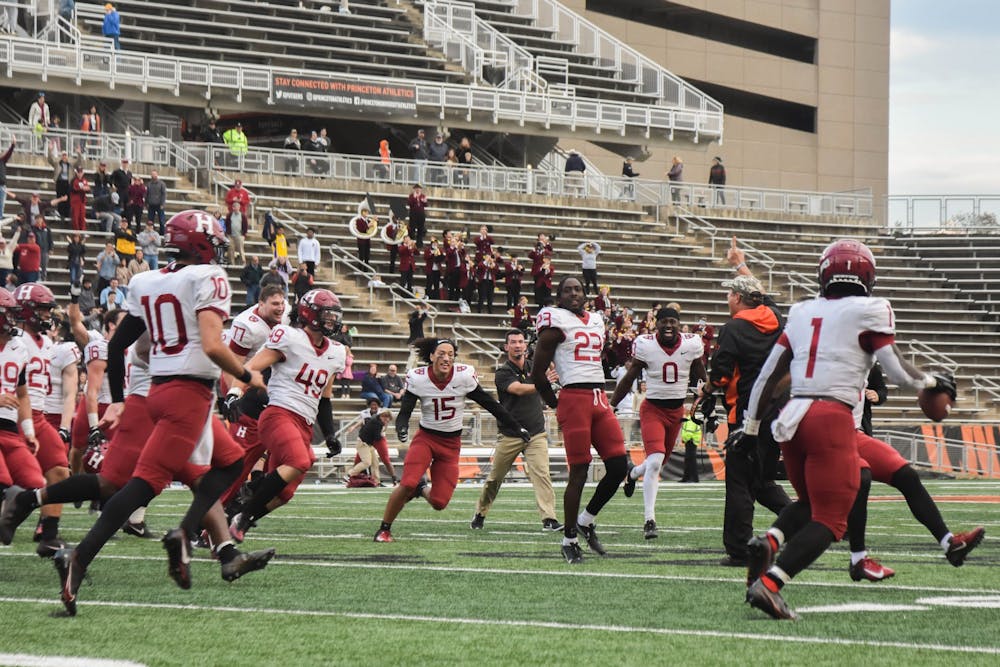The following is a guest contribution and reflects the author’s views alone. For information on how to submit an article to the Opinion Section, click here.
Since Harvard’s football team managed to pull off a last-minute win over Yale to finish 5–2 in the Ivy League — just behind Princeton and Dartmouth, both at 6–1 — there has, predictably, been more whining out of Cambridge about how Harvard would have, could have, SHOULD have been co-champions with Dartmouth, if only the Crimson had not had a victory over Princeton taken away from them by replay officials in October.
Don’t listen to that nonsense.
I’m here to tell you that Princeton’s 18–16 win over Harvard was completely legit, that the officials’ call was correct and appropriate under the NCAA’s rules, and that the bonfire on Cannon Green and Princeton’s Ivy League Championship were totally deserved.
Let’s recall the circumstances that Harvard complains about. The hard-fought game was tied 13–13 at the end of regulation time. And it remained tied 16–16 at the conclusion of the first two overtime periods. Under the NCAA’s new overtime rules, the next overtime periods consisted of each team having one shot at a two-point conversion from the three-yard line. If one team scored and the other one did not, the game would be over. Also, crucially, each team was allotted one time-out for each overtime period.
In the third overtime, Princeton went first and failed to score. Harvard then lined up at the three-yard line. Princeton’s head coach Bob Surace ’90 rushed onto the field to request a time-out, but for some unknown reason, the on-field officials did not signal time-out, and Harvard snapped the ball and scored, appearing to win the game. The Harvard team ran onto the field, surrounding Surace, who was holding his hand in the air and requesting a review of the play, which he believed never should have been initiated since he had clearly (and ostentatiously) requested a time-out before the play. The officials convened, watched the video, and saw Surace requesting a time-out before Harvard snapped the ball. Accordingly, they determined that a time-out should have been signaled and so they disallowed Harvard’s score. Harvard failed to score when they re-ran the play, and ultimately Princeton won the game in the fifth overtime.
The next day, the Ivy League released a statement on Twitter stating that the officials had made a “procedural error as a time-out can only be recognized and granted prior to the snap by an on-field official and is not reviewable. Therefore, the time-out should not have been granted and the play should have resulted in a successful two-point conversion.”
Nevertheless, the League said, the “outcome of the game will stand as a win for Princeton.” This led to headline after headline blaring that the Ivy League had “admitted” that the officials had erred and articles suggesting that Harvard had been robbed of a victory. Harvard’s athletic director even went to Twitter to make her own jaw-dropping statement complaining of the unfairness of the outcome, which she attributed to a “major officiating error,” and expressing her appreciation to the Ivy League for visiting “appropriate repercussions” on the officiating crew. Reading her statement, you would think the officials were some kind of recidivist criminals.
What stood out to me amid this brouhaha was that neither the Ivy League, the Harvard athletic director, nor any of the news articles ever cited any NCAA rule that the officials allegedly violated by reviewing and reversing the play. That to me was a huge, bright red flag — strike that, a crimson flag. So I did what any half-decent lawyer trained at a certain legal trade school in a town adjacent to Boston would do and spent hours poring over the 2021 NCAA Football Rules Book with a fine-toothed comb. And I can tell you that there is no rule that says a time-out can only be recognized and granted prior to the snap by an on-field official or that a failure to call a time-out is not reviewable.
In fact, NCAA Rule 12-3-7 expressly states that “the replay official may correct obvious errors that may have a significant impact on the outcome of the game, including those involving the game clock, whether or not a play is reviewable.” And that is precisely what happened here. It is an obvious error if a team has a time-out remaining (as Princeton did), a coach clearly requests a time-out before the opposing team snaps the ball because the coach sees his defenders are out of position, are short a player, or for any other reason (as Surace did), but the request is not granted by officials (as occurred here).
Rule 3-3-4 clearly states, “When time-outs are not exhausted, an official shall allow a charged team time-out when requested by any player or head coach when the ball is dead.” And undoubtedly the on-field officials’ failure to signal time-out before Harvard snapped the ball had a “significant impact” on the game — a dispositive impact, in fact. So the officials were completely justified in reviewing the video, realizing their error when they saw Surace waving his arms on the field and requesting a time-out, and rectifying the mistake by making Harvard re-run the play. In fact, the officials’ acknowledgment of their initial error was courageous, deserving of praise, and certainly did not warrant any of the negative “repercussions” that the League has apparently meted out to them.
So I hope you enjoyed the bonfire, Tigers, and take pride in your asterisk-free Ivy League Championship. You deserve them both.

Michael Vatis is a member of the Class of 1985. He is a lawyer in private practice in New York. He previously served as a law clerk to Ruth Bader Ginsburg and Thurgood Marshall, and as an official in the Department of Justice, FBI, and Department of Defense. He can be reached at mvatis@steptoe.com








